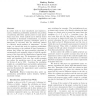Free Online Productivity Tools
i2Speak
i2Symbol
i2OCR
iTex2Img
iWeb2Print
iWeb2Shot
i2Type
iPdf2Split
iPdf2Merge
i2Bopomofo
i2Arabic
i2Style
i2Image
i2PDF
iLatex2Rtf
Sci2ools
123
click to vote
SDM
2003
SIAM
2003
SIAM
Approximate Query Answering by Model Averaging
In earlier work we have introduced and explored a variety of different probabilistic models for the problem of answering selectivity queries posed to large sparse binary data sets. These models can be directly scaled to hundreds or thousands of dimensions, in contrast to other approximate querying techniques (such as histograms or wavelets) that are inherently limited to relatively small numbers of dimensions. In this paper, we extend this work by applying probabilistic model-averaging to the problem of query answering, a scheme that allows the query-answering algorithm to automatically and optimally adapt to both the specific nature of the data and the distribution of queries being issued any specific user. We demonstrate that on realworld and simulated data sets that model-averaging can reduce the prediction error of any single model by factors of up to 50%. Learning the combining weights is a straightforward and scalable optimization problem that can be easily automated, providi...
Related Content
| Added | 01 Nov 2010 |
| Updated | 01 Nov 2010 |
| Type | Conference |
| Year | 2003 |
| Where | SDM |
| Authors | Dmitry Pavlov, Padhraic Smyth |
Comments (0)

